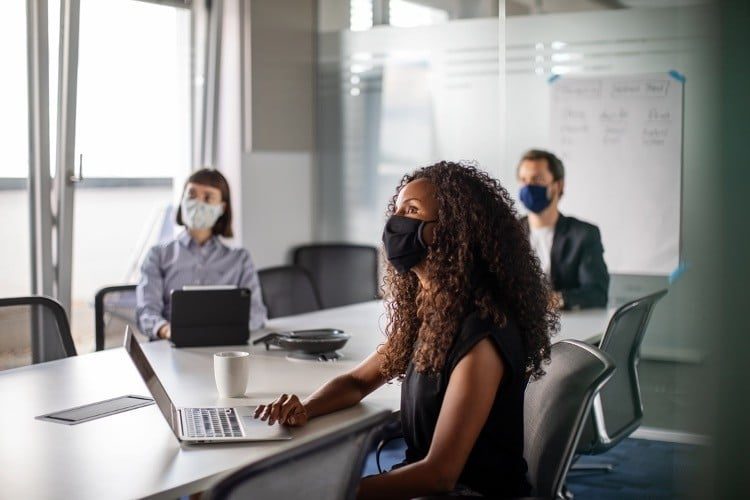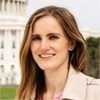
California employees will soon be able to skip masks in the workplace, but only if every employee in the room is fully vaccinated against COVID-19.
The revised rules adopted Thursday night by a sharply divided California Occupational Safety and Health Standards Board (Cal/OSHA) are expected to start on June 15, the same day the state more broadly loosens masking and other requirements in social settings in accordance with recent CDC recommendations that suggest fully vaccinated people don’t need to wear a mask or face covering in most indoor settings.
The rules would allow workers in a room to take off their masks if every person there is fully vaccinated and does not have COVID-19 symptoms. Masks would still be required if anyone in the room is not fully vaccinated.
Someone is considered fully vaccinated 14 days after receiving a second dose of the Pfizer-BioNTech or Moderna vaccines, or a single shot of the Johnson & Johnson vaccine. Workplaces would need to have workers’ vaccine records on file to comply with Cal/OSHA regulations.
Workers in places such as retail stores and restaurants, as well as others who interact with members of the public, will still need to mask up. Workers in some other settings, such as hospitals, will not be affected by the rule change.
Reportedly, the board members made clear that the regulations are only a stopgap while they consider further easing pandemic rules in coming weeks or months.
The board initially rejected the revised masking rules for employees by a 4-3 vote. But members reconsidered when they realized that would leave workers with more restrictive current standards, which require masks for all employees, along with social distancing and partitions between employees in certain circumstances.
They then unanimously adopted the revised rules to give a newly appointed three-member subcommittee time to consider more changes.
“We don’t want to leave the last one in place when this is better than that,” chairman David Thomas said.
“We have to create reasonable and enforceable standards,” said board member Nola Kennedy, an initial “no” vote. “I just don’t think this proposal is there yet.”
As reported by the San Francisco Chronicle, several unions applauded the rules as protecting workers in industries such as education, healthcare, and food service, while scores of business trade groups and some employers spoke at the meeting to oppose regulations they deemed burdensome, arguing the proposed rules conflicted with recent CDC guidance, as well as with Governor Gavin Newsom’s declaration that California can return to business as usual on June 15. Some Cal/OSHA board members said the “confusion” and resistance from business groups revealed problems with the proposal.
“The face coverings and mask requirements are more restrictive and onerous than they need to be,” said Melissa Patack, vice president of the Motion Picture Association of America, during public comments.
Some observers said the masking requirements could stigmatize unvaccinated people.
“Employees will be pissed off, wondering whose fault it is that they have to wear a mask,” said Stephen Hirschfeld, a San Francisco employment lawyer, speaking before the meeting. “This could set up a situation where they try to figure out who is unvaccinated and give them a hard time.”
For some members who initially rejected the revision, the deal-breaker was a requirement that employers stockpile the N-95 face masks for employees who chose to use them starting July 1.
Even when everyone in a room is vaccinated, the rules require social distancing continue until July 31, more than six weeks after the state’s planned reopening. After July 31, employers must offer respirators to all unvaccinated workers for voluntary use, which would provide an alternative to having to stay six feet away from others.
Large quantities of N-95s are still used by healthcare workers, and soon will be needed to protect Californians against wildfire smoke, so forcing employers to stockpile them could exacerbate shortages, speakers said.
“Logistically I’m just unclear how a business determines how many, how much,” said Chris Laszcz-Davis, a management representative on the board who initially voted to reject the revised regulations. “I’m not sure how much we’re buying by recommending N-95s. Why not a surgical mask?”
The board plans to regroup at its June 17 meeting, but further revising the rules will be a lengthier bureaucratic process. The three-member subcommittee will try to craft acceptable revisions that then must be drafted by Cal/OSHA employees before a public review.
Without a further revision, the new rules could remain in place into early next year, even though coronavirus cases have fallen dramatically in the state after a severe winter spike. The Golden State has been hit hard by the pandemic, and has, according to some, already reached herd immunity against COVID-19, making any restrictive masking regulations medically pointless.




